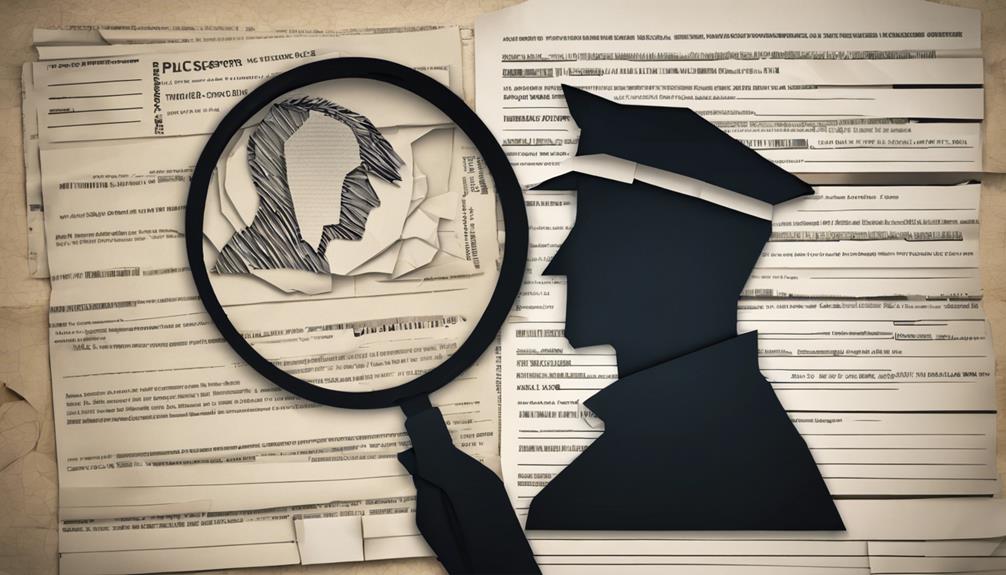Banks usually conduct background checks for loans to assess applicants' financial stability, trustworthiness, and repayment capability. They verify employment details, income sources, and identity for a thorough evaluation. This process helps lenders make informed decisions to minimize risks and promote fair lending practices. By understanding the significance of these background checks, applicants can enhance their chances of loan approval.
Key Takeaways
- Banks conduct background checks for loans to assess financial stability.
- Checks include credit history, employment verification, and income consistency.
- Criminal background checks may be part of the evaluation process.
- Compliance with regulations ensures fair lending practices.
- Thorough checks aid in informed decision-making for loan approvals.
What Lenders Look for in Checks

When conducting background checks for loans, lenders primarily focus on credit history, employment verification, and accurate information. An important factor in loan approval is the applicant's credit history, which reflects their past financial behavior and ability to repay debts.
Employment verification is also essential as lenders seek to confirm the stability of the borrower's income source. Additionally, providing accurate information is necessary to pass the background check successfully.
Lenders also consider the debt-to-income ratio during the background check process. This ratio helps lenders evaluate the borrower's ability to manage additional debt based on their current income level.
Furthermore, some lenders may conduct criminal background checks, which could impact the final decision on loan approval. As a result, applicants must make sure that they provide all necessary documentation and information truthfully to increase their chances of obtaining loan approval.
Verification of Employment and Income
During the background check process for loans, one key aspect that lenders focus on is verifying the applicant's employment and income. Lenders undertake this verification to ensure that the borrower has a stable income source and can meet their financial obligations, reducing the risk of default on the loan. Income verification is crucial as it helps lenders assess the borrower's capacity to repay the loan on time. Employment details provided in the mortgage application must align with the information verified by the lender to confirm the applicant's consistency and reliability.
| Verification of Employment and Income |
|---|
| 1. Lenders verify employment to ensure the applicant can make timely mortgage payments. |
| 2. Income verification is crucial for assessing the borrower's capacity to repay the loan. |
| 3. Lenders check tax returns and income consistency to confirm financial stability. |
| 4. Employment details must align with the information provided in the mortgage application. |
| 5. Verification of employment and income is a critical step in the mortgage approval process. |
Identity Verification for Applicants

Banks employ stringent identity verification procedures to confirm the authenticity of loan applicants. This process typically involves cross-checking details like driver's license information and Social Security numbers.
Identity Verification Process
Identity verification for mortgage applicants involves confirming their identity through checks on their driver's license and Social Security number. This essential step is mandated by federal law to prevent fraud in the financial lending process. By verifying the identity of applicants, lending institutions protect themselves from potential risks associated with loaning money to unauthorized individuals. Compliance with legal requirements is vital for lending institutions to operate within the bounds of the law. DataCheck, a service specializing in identity verification, plays a significant role in assisting lenders in making well-informed decisions regarding loan approvals.
| Identity Verification Process | Importance |
|---|---|
| Confirms applicant's identity | Prevents fraud in financial transactions |
| Federal law mandate | Protects lenders from risks |
| Compliance with legal requirements | Ensures adherence to regulations |
| DataCheck verification | Assists lenders in informed decision-making |
Verification Requirements Met
To meet verification requirements for mortgage applicants, lending institutions diligently confirm the identities of individuals through various checks.
Checking Driver's License and Social Security Number: Banks verify the authenticity of these essential identification documents to guarantee the applicant's identity matches the information provided in the mortgage application.
Compliance with Federal Law: Financial institutions adhere to federal regulations mandating identity verification to prevent criminal activities such as fraud and money laundering in the lending process.
Protecting Against Unauthorized Approvals: Confirming applicant identities shields banks from potential risks associated with unauthorized or fraudulent loan approvals. By conducting thorough identity verification procedures, lending institutions safeguard themselves and their clients from potential financial harm.
DataCheck's Role in Background Checks
DataCheck plays a pivotal role in verifying the identities, employment, and income of mortgage applicants for lending institutions. Mortgage lenders rely on DataCheck to conduct thorough background checks, which include credit checks, employment history verification, and screening for any criminal records.
By scrutinizing these aspects, DataCheck assists financial services providers in making well-informed decisions regarding loan approvals. The extensive services offered by DataCheck ensure that applicants are financially responsible and suitable candidates for mortgage loans.
These background checks are essential for lending institutions to mitigate risks and loan money to qualified buyers. DataCheck's role in the verification process enhances the overall lending process by providing lenders with the necessary information to assess the creditworthiness and reliability of potential borrowers accurately.
Importance of Background Checks

Background checks play a crucial role in the loan approval process by helping lenders assess the financial stability and credibility of potential borrowers. These checks enable lenders to verify employment history, income sources, and creditworthiness, ensuring that loans are granted to qualified individuals who are likely to repay them.
Need for Background Checks
Performing thorough background checks is crucial for banks when evaluating loan applicants' financial stability and creditworthiness. These checks help banks in various ways:
- Risk Mitigation:
By appraising factors like credit scores, criminal history, and financial stability, banks can better evaluate the likelihood of a loan applicant defaulting on payments. This risk appraisal is essential for safeguarding the bank's assets and maintaining financial stability.
- Compliance Regulations:
Banks are required to adhere to strict compliance regulations to guarantee fair lending practices and prevent financial crimes like money laundering. Conducting background checks helps banks meet these regulatory requirements and protect against potential legal issues.
- Informed Decision-Making:
Verification of employment, income, credit history, and identity through background checks provides banks with the necessary information to make informed decisions on loan approvals and terms. This thorough evaluation process helps mitigate risks and enhances the overall quality of the lending process.
Loan Approval Criteria
How do lenders determine eligibility for loans through rigorous background investigations?
When it comes to loan approval criteria, lenders scrutinize various aspects of an applicant's financial background. This includes evaluating credit scores, verifying income sources, and reviewing employment history.
Credit scores play a significant role in determining a borrower's creditworthiness, with higher scores often leading to more favorable loan terms.
Income verification is important to ensure that the borrower has the financial means to repay the loan. Lenders also consider employment history to gauge stability and consistency in income.
Additionally, some lenders may conduct criminal background checks to evaluate the risk associated with the loan.
Overall, a thorough background check encompassing credit scores, income verification, employment history, and potentially criminal background checks is vital in the loan approval process.
Understanding these criteria can help applicants prepare adequately and improve their chances of securing a loan.
Risk Assessment Factors
Lenders assess the risk associated with loan applications by examining various factors, including credit history, employment status, and potential criminal backgrounds. These risk assessment factors play a pivotal role in determining the financial stability and trustworthiness of individuals seeking loans.
Here are three key considerations in the risk assessment process:
- Credit History: A solid credit history demonstrates a borrower's ability to manage debt responsibly and make timely repayments, indicating a lower risk for the lender.
- Employment Status: Stable employment provides assurance to lenders that the borrower has a reliable source of income to meet loan obligations, reducing the risk of default.
- Criminal Background: Any past criminal activities can raise concerns about the borrower's integrity and ability to repay the loan, impacting the lender's decision on loan approval.
Factors Lenders Review During Checks
During checks, lenders meticulously assess various financial aspects to determine loan eligibility. Employment history plays a critical role, with lenders typically requiring a minimum of two years of steady work to guarantee financial stability.
Documentation of all income sources is vital, including side gigs and investments, as it provides a detailed picture of the borrower's financial situation. For self-employed individuals seeking a mortgage, demonstrating a consistent two-year income history is necessary to qualify for a loan.
Additionally, passive income streams like rental property earnings are taken into account by mortgage companies during background checks to evaluate the borrower's overall financial health. Some lenders may also conduct criminal background checks as part of the mortgage approval process, impacting loan eligibility based on the findings.
These factors are thoroughly reviewed by lenders to make informed decisions regarding loan approvals.
Frequently Asked Questions
What Kind of Background Checks Do Banks Do?
Banks conduct credit history, employment, and income verifications when evaluating loan applicants. They review criminal records, credit scores, and financial stability to evaluate risk. Verification of identity, past employment, and financial standing are essential for loan eligibility.
How Do Banks Verify Employment for Loans?
Banks verify employment by confirming job details like position, tenure, and income stability. This process involves directly contacting employers to validate employment status and income. Pay stubs, tax returns, or employer letters may be requested to confirm income consistency.
Does a Background Check Show Loans?
Background checks for loans typically focus on credit history, income stability, and employment verification. Lenders assess loan repayment capability through credit reports. Bank background checks often do not show individual loans taken out by applicants.
How Far Back Does a Bank of America Background Check Go?
Background checks conducted by Bank of America typically go back 7-10 years. They include criminal history, credit history, and employment verification. The depth of the check varies based on the loan amount and type.
Conclusion
To sum up, banks do conduct background checks for loans to confirm that applicants are qualified and trustworthy. By validating employment, income, and identity, lenders can make informed decisions on loan approvals.
But do these checks truly make a difference in reducing risk for banks and protecting borrowers? Only time will tell.









